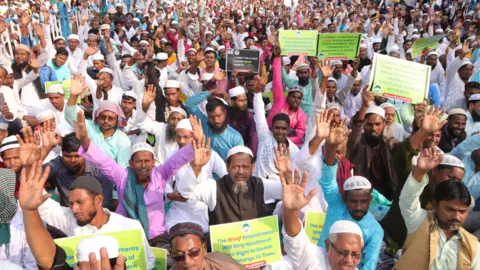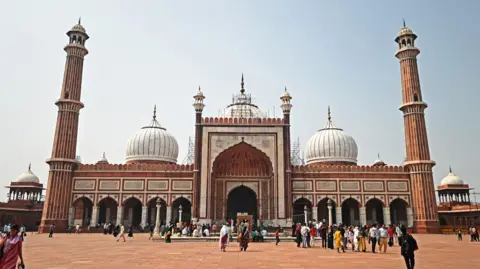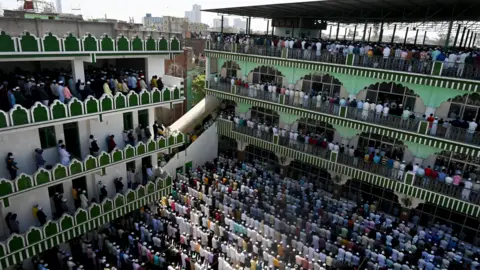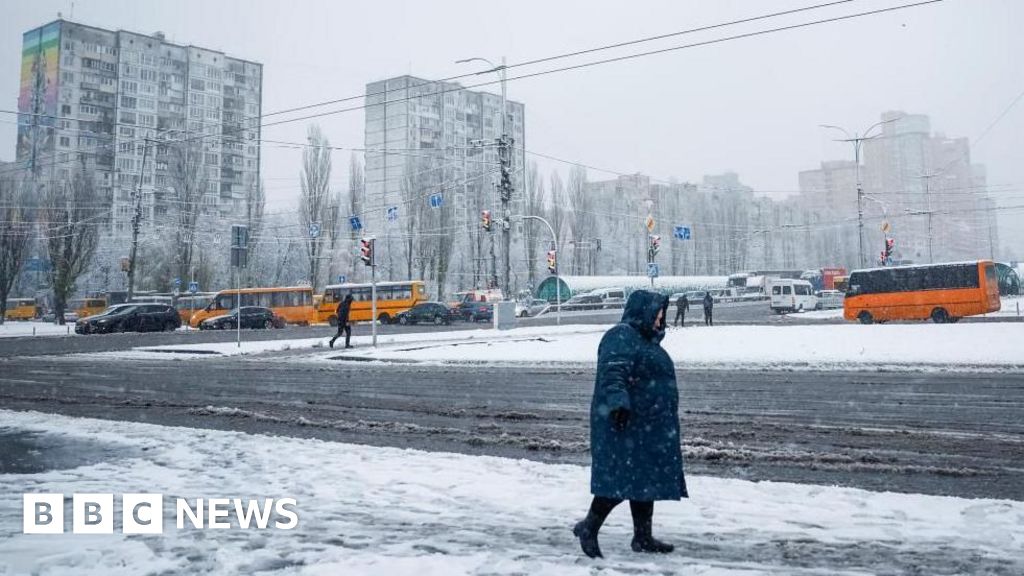ARTICLE AD BOX

 Getty Images
Getty Images
Several Muslim groups have called the proposed changes politically motivated
A proposal to amend a decades-old law that governs properties worth millions of dollars donated by Indian Muslims over centuries has triggered protests in the country.
The properties, which include mosques, madrassas, shelter homes and thousands of acres of land, are called waqf and are managed by a board.
The new bill - which introduces more than 40 amendments to the existing law - was expected to be tabled in the current parliament session after incorporating changes suggested by a joint committee of MPs.
But the committee is now set to ask for more time to submit its recommendations.
Prime Minister Narendra Modi's government says that the proposed changes are necessary to root out corruption in the management of these properties and address demands for reform from the Muslim community.
But several Muslim groups and opposition parties have called the changes politically motivated and an attempt by Modi's Hindu nationalist party to weaken the rights of minorities.
The bill was first introduced in parliament in August but then sent to a joint parliamentary committee for their recommendations.
What is waqf?
In Islamic tradition, a waqf is a charitable or religious donation made by Muslims for the benefit of the community. Such properties cannot be sold or used for any other purpose - which implies that waqf properties belong to God.
A vast number of these properties are used for mosques, madrassas, graveyards and orphanages, and many others are vacant or have been encroached upon.
The tradition of waqf in India can be traced back to the Delhi Sultanate period in the 12th Century when the early Muslim rulers from Central Asia came to India.
The properties are now governed by the Waqf Act, 1995, which mandated the formation of state-level boards. These boards include nominees from the state government, Muslim lawmakers, members of the state bar council, Islamic scholars and managers of waqf properties.
The government says that the waqf boards are among India’s largest landholders. There are at least 872,351 waqf properties across India, spanning more than 940,000 acres, with an estimated value of 1.2 trillion rupees ($14.22bn; £11.26bn).

 Getty Images
Getty Images
Waqf properties include mosques, madrassas, shelter homes and thousands of acres of land
Is there a need for reform?
Muslim groups agree that corruption is a serious issue in waqf boards - its members have been accused several times of colluding with encroachers to sell waqf land.
But critics also say that a significant number of these properties have been encroached by individuals, businesses and government bodies – which too requires immediate attention.
A report submitted in 2006 by the Justice Sachar Committee - formed by the earlier Congress party-led government to assess the socioeconomic conditions of Muslims in India - had recommended waqf reform, as it found that the revenues from the boards were low compared to the vast number of properties they managed.
The committee estimated that efficient use of the land had the potential to generate an annual revenue of about 120bn rupees (1.4bn; £1.1bn). The current annual revenue, according to some estimates, is around 2bn rupees.
The committee also noted that “encroachments by the State, who is the custodian of the Wakf interests, is common”, listing hundreds of instances of such “unauthorised occupation” of waqf land by government authorities.
According to government data, at least 58,889 of waqf properties are currently encroached upon, while more than 13,000 are under litigation. The status of more than 435,000 properties remains unknown.
The amendments, the government says, address these issues and advance the recommendations made by the Sachar Committee.
Parliamentary affairs minister Kiren Rijiju told The Times of India newspaper that the reforms were also necessary as only an elite section in the Muslim community managed these properties.
Why the controversy?
But many Muslims see the proposed changes with scepticism.
One of the most contentious aspects of the bill is the change to ownership rules, which would impact historical mosques, dargahs and graveyards owned by the board.
Many of these properties - in use by Muslims for generations - lack formal documentation as they were donated orally or without legal records decades or centuries ago.
The 1954 Waqf Act recognised such properties under the category of “waqf by user”, but the proposed law omits the provision, leaving the fate of a significant number of these properties uncertain.
Professor Mujibur Rehman, author of Shikwa-e-Hind: The Political Future of Indian Muslims, explains that tracing the ownership of such long-standing community properties is complicated, as their management and deed systems have shifted over the centuries from the Mughal system to the British colonial system, and now to the current system.
“You can trace personal properties up to a few generations, but tracing community properties is more difficult, as their management keeps changing over time,” Prof Rehman says.
Critics claim that the changes may not address the community’s concerns but could instead considerably take away the role of Muslims in controlling waqf properties.
Some agree that a general law mandating people of all religions to be a part of boards that run religious institutions would make processes more secular.
But the current move appears to favour majoritarian politics, Prof Rehman says. “There seems to be an attempt not only to get the state’s control over Muslims’ properties, but also of Hindu community over Muslim community’s lives.”

 Getty Images
Getty Images
Some of the changes to the law would mean several waqf properties have to be re-established as waqf
What are the other proposed changes?
Among other crucial changes is the mandatory requirement for boards to register their properties with district collectors, who would recommend to the government whether the waqf’s claim to a property is valid.
Critics say this will undermine the powers of the waqf boards.
Asaduddin Owaisi, a prominent Muslim MP vocal on the issue, alleges that these changes are intended to strip Muslims of their land.
The current law requires state governments to appoint a survey commissioner who identifies waqf properties, and subsequently prepares a list. The list is then sent to the state government which issues a legally mandated notification. If unchallenged for a year, the final nature of the property becomes waqf.
But some of the changes would mean that the status of several waqf properties will have to be re-established.
"Many have illegally encroached upon waqfs. This means they will get a chance to claim that the property is theirs,” Owaisi recently told reporters.
This process, Muslim groups say, will put many historical dargahs and masjids at risk. They say that reform is needed but it must keep the sensitivity and interests of the community in mind.
“The diagnosis may be correct,” Prof Rehman says, “but the treatment is not.”

 3 hours ago
1
3 hours ago
1








 English (US)
English (US)